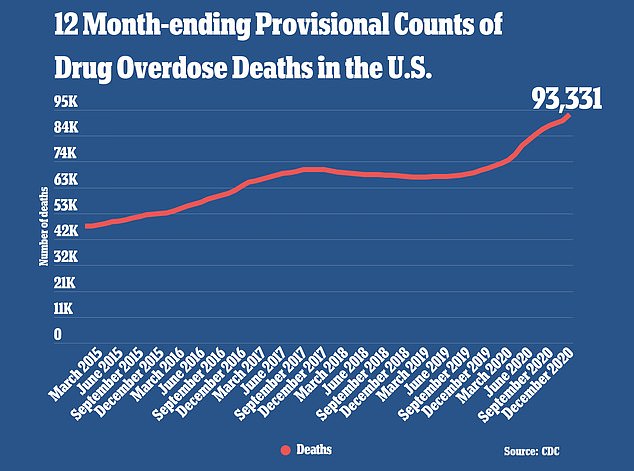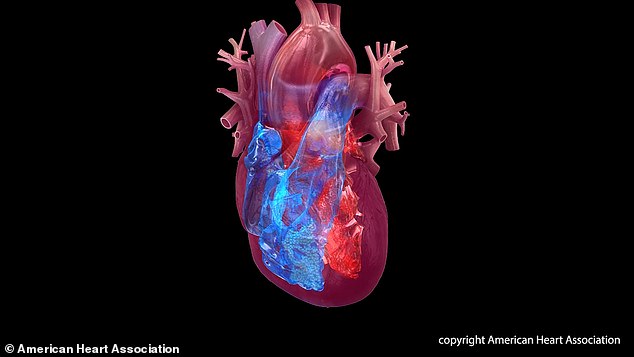Hearts donated by people who died of drug overdoses are safe to use in transplant surgeries, two new studies find.
Researchers examined data spanning more than ten years and found no significant difference in mortality between patients whose heart donors did and did not use illicit drugs.
For example, recipients of heart donations during a period when donors were more likely to use illicit drugs were actually 21 percent less likely to die within the year compared to those who received heart donations during a period with less drug use.
‘We hope that patients who are awaiting transplants are encouraged to accept hearts from donors who had hepatitis C or who died due to a drug overdose,’ said Dr Ravi Dhingra, one of the researchers.

Heart donations from donors who died of drug overdoses are safe for patients, two new studies find. Pictured: Doctors in Turkey perform an organ transplant in April, 2021
Drug overdose deaths hit a record high in 2020, claiming 93,000 lives in the U.S.
One grim side effect of this record is that many of those who die from a drug overdose are organ donors – and they may be able to donate to a growing list of patients in need of transplants.
The number of patients on the waiting list for heart transplants has also hit record highs in recent years.
The country hit a record in 2019, with more than 3,500 patients in the U.S. on that waitlist. As of March 2020, the number had increased to 3,660.
In the past, doctors have hesitated to use hearts donated by people who died from a drug overdose – concerned that these organs may confer risks to the transplant recipients.
But new data from the American Heart Association suggests that, in fact, these donated hearts are safe for patients.
‘This research confirms previous data that these hearts – once considered high risk – are safe,’ said Dr Howard Eisen, chair of the association’s Heart Failure and Transplantation Committee.
‘These findings should encourage institutions who are not routinely using hearts from drug users to do so. It will reduce the waiting time and the number of deaths among people on the heart transplant waitlist.’
Both studies were published Wednesday in journals of the American Heart Association.
The first study, published in Circulation: Heart Failure, was led by Dr David Baran – system director for advanced heart failure and transplantation at Sentara Heart Hospital in Norfolk, Virginia.
The researchers examined the illicit drug use of heart transplant donors using anonymous records from the United Network for Organ Sharing.
These records included 23,000 heart transplants between 2007 and December 2017.

Provisional CDC data show there were 93,331 drug overdose deaths recorded in the U.S. in 2020, a 29.4% jump from 72,151 deaths reported in 2019
Via the records, the researchers were able to access the results of hospital urine tests taken before the heart donors died. They identified illicit drugs in these urine test results, including opioids, cocaine, methamphetamine, alcohol, and marijuana.
The share of heart transplant recipients who survived was comparable between those whose heart donor had used drugs and those whose donor hadn’t, the researchers found.
For example, after one year, 90 percent of heart transplant recipients whose donors used opioids had survived.
After five years, 77 percent had survived, and after ten years, 60 percent had survived. The rates were similar for other drug types and non-drug users.
The researchers even found similar survival rates for transplant recipients whose heart donors had used five or more illicit drugs.
‘We thought that illicit drugs like cocaine or methamphetamine, which can lead to heart attacks, would prove to be dangerous,’ Baran said.
‘However, we were wrong. We should not reject a heart from a donor just because they used one or more illicit drugs.’
In the second study, published in the Journal of the American Heart Association, researchers from the University of Wisconsin-Madison compared survival data from multiple-year spans.
They used the same anonymous records as the previous study, but examined survival rates for heart transplant recipients whose donors died from a drug overdose or had hepatitis C.

The groups found that heart transplant recipients had similar survival rates regardless of the drug use of their heart donors (file image)
Hepatitis C is a viral infection in patients’ livers that spreads through the blood. It can be transmitted via a shared needle or an organ transplant from someone with the infection.
The infection can now be treated with antiviral drugs that make the disease manageable, however, leading the University of Wisconsin researchers to hypothesize that it is no longer a significant risk for transplant recipients.
The researchers compared organ donations between two periods, 2003 to 2007 and 2013 to 2017.
Donors in the later period were more likely to use illicit drugs and to have high blood pressure and diabetes, increasing hepatitis C risk.
But the risk of death among donation recipients in the later period, 2013 to 2017, was actually lower than the risk in the earlier period.
Patients who received an organ donation in 2013-2017 were 15 percent less likely to die one month after their transplant, compared to those recipients in 2003 to 2007.
A year later, the difference in mortality risk increased to 21 percent lower for recipients in the 2013-to-2017 group.
‘We hope that patients who are awaiting transplants are encouraged to accept hearts from donors who had hepatitis C or who died due to a drug overdose, if their health care team finds the donor heart to be an appropriate match,’ said lead author Dr Ravi Dhingra, a medical professor at the University of Wisconsin/
Dhingra noted that ‘about 20 percent of patients on the heart transplant waiting list die while waiting to receive a transplant or become too sick to remain good transplant candidates.’
Donations from those who die from drug overdoses may help alleviate this waiting list.
Source link : https://www.dailymail.co.uk/health/article-9832439/Hearts-donors-died-drug-overdoses-safe-use-transplant-surgeries-studies-find.html











